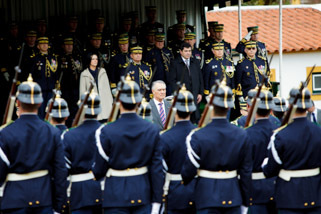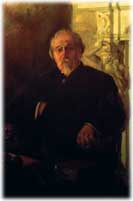
 Manuel José de Arriaga Brum da Silveira
Manuel José de Arriaga Brum da Silveira
Born on 8 July 1840 in Horta, son of Sebastião de Arriaga and of Maria Antónia Pardal Ramos Caldeira de Arriaga, both descended from noble Azorean families.
He married Lucrécia de Brito Berredo Furtado de Melo, granddaughter of the Oporto police commandant who favoured the liberal forces during the 1820 revolution. They had six children, two boys and four girls. He died on 5 March 1917 aged 77.
PROFESSIONAL ACTIVITY
At Coimbra University, where he graduated in law, he had republican ideas that led to an irreparable breach with his father who promptly disinherited him and stopped paying his studies. To pay his law degree he had to teach English at a school.
In 1866 he applied to be lecturer of the tenth subject at the Polytechnic School as well as history in the arts faculty. As he was not accepted, he continued to teach English, but in Lisbon. Ten years later, on 26 August 1876, he was already a member of the Commission to Reform Secondary Education. At the same time he established himself as a lawyer, becoming a remarkable casuist as a result of his honesty and knowledge. Some of the causes he defended include his defence in 1890 of António José de Almeida after his article entitled "Bragança, o último" against King Carlos, appeared in the academic newspaper O Ultimatum.
After the events of 5 October 1910 he was appointed vice-chancellor of Coimbra University to calm the agitated spirit of the students. He took office on 17 October 1910.
POLITICAL CAREER
A member of the Republican Party, he was elected four times as a member for the Madeira constituency. In 1890 he was imprisoned following the patriotic demonstrations of 11 February against the British Ultimatum.
During the time of the 31 January revolt of 1891 he was already a member of the party directorate, together with Jacinto Nunes, Azevedo e Silva, Bernardino Pinheiro, Teófilo Braga and Francisco Homem Cristo.
In the last years of the monarchy he suffered from some obscurity, as the republican movement had reached the conclusion that the overthrow of the monarchist regime could not be achieved peacefully. The doctrinaire republicans were replaced by men of action who provided links to the freemasons and the Carbonária.
After the proclamation of the republic he was called to the office of Public Prosecutor.
ELECTIONS AND PRESIDENTIAL PERIOD
He was elected on 24 August 1911, proposed by António José de Almeida, head of the evolutionist faction, against the more direct candidate, Bernardino Machado, proposed by the faction that would eventually become the Democratic Party under Afonso Costa. The results were as follows:
Manuel de Arriaga 121 votes
Bernardino Luís Machado Guimarães 86 votes
Duarte Leite Pereira da Silva 1 vote
Sebastião de Magalhães Lima 1 vote
Alves da Veiga 1 vote
Blank votes 4 votes
During his term in office the following governments were sworn in:
At this time there was an effective division of the republican forces. From 27 to 30 October 1911 the Republican Party Congress met in Lisbon and elected the list under Afonso Costa, after which the party became known as the Democratic Party. On 24 February 1912, because he disagreed with the new party policy, António José de Almeida formed the Evolutionist Party, and two days later, Brito Camacho, the Republican Union Party, although this division did little to settle any of the contradictions of this difficult period. The start of World War I further worsened the situation and let to disputes between the pro-war and the anti-war factions.
The Ministry under Victor Hugo de Azevedo Coutinho, nicknamed The Miserable Ones, lasted from 12 December 1914 to 25 January 1915. It changed nothing and was dismissed following the events caused by the military-inspired “Movement of the Swords”, in which captain Martins de Lima and Commandant Machado Santos played a prominent part.
President Manuel de Arriaga attempted in vain to call the republican forces to reason, doing everything in his power to achieve an understanding between the main party leaders. These attempts having failed, as he had no powers to help arbitrate the disputes and impose suitable solutions and was pressured by the military he invited General Pimenta de Castro to form a government, which was sworn in on 23 January 1915.
The closure of Parliament and the amnesty awarded to Paiva Couceiro confirmed the mistrust that the republican sectors had of this man, from the time of João Chagas’ government, when as minister of war he had been permissive towards Couceiro’s monarchical attempts. Revolt was forthcoming. On 13 May of that year, sectors of the navy under Leote do Rego and José de Freitas Ribeiro sacked the Government which was replaced by that of José de Castro, sworn in on 17 May.
The President was forced to resign on 26 May 1915 and left Belém Palace under the escort of the Republican Guard.
POST-PRESIDENTIAL ACTIVITY
Manuel de Arriaga did not recover from this setback and became a bitter man. He died two years later, on 5 March 1917. He was replaced by Teófilo Braga.
PRINCIPAL WORKS
He was renowned mainly as a lawyer and orator. Some of his political speeches are famous, in particular, "O Partido Republicano e o Congresso", given at Clube Henriques Nogueira on 11 December 1887, "A Questão da Lunda", in the Chamber of Deputies in 1891, "Descaracterização da Nacionalidade Portuguesa no regime monárquico", in 1892 in the same Chamber, "Começo de liquidação final", "A irresponsabilidade do poder executivo no regime monárquico liberal", and many others. Contos Sagrados, Irradiações e Harmonia Social are examples of his philosophical and poetical works.
His experience as President of the Republic is recounted in his last work, written after he had left, under the title Na Primeira Presidência da República Portuguesa.
© 2006-2016 Presidency of the Portuguese Republic
You have gained access to the records of the Official Site of the Presidency of the Republic from 9 March 2006 to 9 March 2016.
The contents available here were entered in the site during the 10 year period covering the two mandates of President of the Republic Aníbal Cavaco Silva.